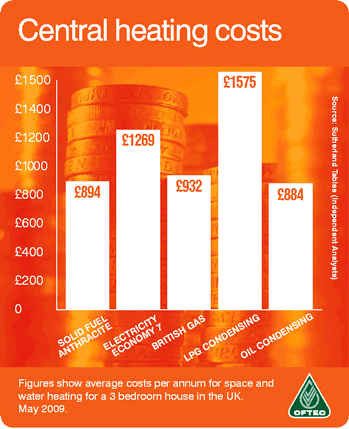Digit - the comparison is SUTHERLAND ASSOCIATES. - They've been doing it for many many years, as long as I can remember, in fact. They issue figures to Oil & Gas supply companies , primarily for marketing use by them, one would presume.
As stated by others - Insulation, and lots of it will keep costs down.
Understand though, that Insulation on its own does not generate heat. Its about controlling heat loss, and heat transfer.
Heating is always about trade-offs.
Heat wants to 'equalise' - If you have a room at 22 degrees and an uninsulated void above it at 10 degrees, the heat wants to 'equalise' that differential more eagerly than if the void is at 18 degrees, for example. Therefore your need is to prevent the rate of that loss or transfer - i.e. maximum insulation.
The ONLY way to make any heating appliance SAVE money, is to turn the bloody thing off.
Having said that.. if you want to make it as cost-effective as possible, then, in addition to the insulation, the best way to achieve this is to go for as sophisticated a controls system as you can afford, and indeed understand, in terms of its operation.
Its pointless installing 1200 quids worth of control gear, if you have not got the first idea of how to get the best from it.
Programmable room-stat's, Sophisticated Control programmers, Zoning, etc etc will all assist in achieving maximum efficiency.
All Atmospheric Gas burners ( in your boiler ) are 'range-rateable'... you could be running your boiler at too high a burner pressure.. get it checked and set. This is also replicated in oil fired equipment... assuming your on a pressure-jet burner ( most of the old Rotary Vapourisers and Fan-assisted vapourisers have been consigned to the skips by now ) - The pump which delivers the oil to the atomising nozzle is range-rateable... again, get it checked... most run at around 130psi on kero ( 150 on Gasoil )... the walls of the firebox can only transfer the heat to the water jacket at a given rate of thermal conductivity.. if you exceed it.. the heat goes right up the flue... get it set up by a good qualified oil burner techy who knows what he's doing... it'll run all the better for it.
The calorific value of LPG / Nat gas is indeed slightly different, however that is largely irrelevant, because the applicance in question is designed to perform within given input/output parameters. EG - Anthracite has a much higher calorific value than gas.. but a Solid fuel boiler designed to output 100,000 btu, will do indeed that.. - output 100,000 btu. - the same as an LPG Boiler designed to output 100,000 will do likewise... the actual calorific value by a given volume is an irrelevance.
Its like saying LPG will only combust at a 3 -- 8% Concentration Gas-in-Air, whereas nat gas is 5-15%.. it doesnt matter !
Its incredibly easy to get 'hung-up' on utter irrelevances when it comes to space heating. Its NOT an exact science, and cannot be, as there are far too many variables which change on a minute-by-minute basis, with regards to the changes of room-air volume, outside temperatures, hot water demand, etc etc.. its constantly varying.
That is why heating is a trade-off, thats why its almost essential to slightly 'over-size' when designing...
Oil has risen because the price of Brent Crude just hit an all time high of $120 a barrel... thats all to do with exploration and production costs, and some other 'excuses to hike the price, like the recent Grangemuth strike... and guess where GAS comes from ! it'll rise pro-rata within a few short weeks, as will electricity, which still depends largely on steam-turbines which are fired by.... oil or gas.
There's no mystery to this stuff.. :wink:
Insulation AND Control system that you can understand and operate... And a good 'proper' service and setup of the boiler... not the dust blown off its nose and a quick hoover out.... done by a proper combustion techy.
Its not rocket science.. and the 'mystique' people seem to always build around it is , well baffling !
She's basic physics, guys... nowt more :wink:
Your gas oil is working out at the same price as your Kero there... but keep an eye and ear to the ground.. that isn't always the case... they go up and down, based on prices on the 'spot market' in Rotterdam, on a day to day basis.
Dont want it to cost money ? put an extra jumper on, and turn the boiler off !


:lol: :lol:
EDITED BY SELF - A thought did just occur... if you're getting through too much oil by your own expectations... how confident are you about the integrity of the supply line between tank and boiler ?
If its as old as you have indicated, you could be losing oil through leak(s) in the pipeline underground or something similar... chances are, if its an old installation, it could be piped in Mild steel, with little or no protection of the pipe under the ground and it could be corroded to oblivion.. even if its in 1/2" or 10mm copper, again it could be ill-protected, and have had its integrity compromised by stones etc through ground movement over the years. -- always look for the simplest explanation first !
Given that its an older property, with the typical 'older property idiosynchracies' with regards to things like the heating system... there is probably a huge amount that can be done to improve its performance. Let us know of what you find !
Alun.

































